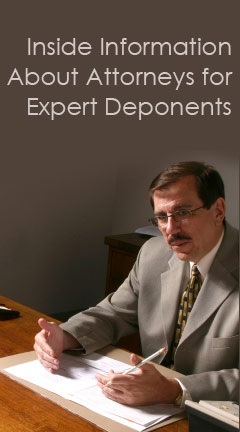Archival Notice
This is an archive page that is no longer being updated. It may contain outdated information and links may no longer function as originally intended.
Home | Glossary | Resources | Help | Course Map
It may be helpful for the testifying expert to have some inside knowledge about how attorneys prepare and conduct their depositions. Prior to the deposition of an opposing expert, the deposing attorney will often:
- Subpoena all documents in the expert's possession relating to the matter at hand.
- Obtain copies of such documents far enough in advance of deposition to permit review by the lawyer and consultants, possibly including opposing experts.
- Obtain a biographical sketch of the expert and check its accuracy.
- Prepare an outline to use as a guide during deposition.
Expert witnesses should not underestimate a deposing attorney's knowledge. The properly prepared deposing attorney will have read other experts' materials on the subject matter, reviewed reports and correspondence, communicated with the other party's experts, and anticipated the theories that will be introduced in the deposition.
The deposing attorney is likely to have prepared carefully for the deposition, and the testifying expert should do the same. This may include re-reading relevant articles, books and publications that the expert authored as well as reviewing the expert's deposition testimony in other cases. The deposing attorney frequently obtains such information before a deposition. Perhaps the most damaging evidence to impeach an expert's credibility is the expert's own authored publications or his or her deposition testimony in other cases.
Before a deposition of the expert, the proffering attorney may:
- Review the expert's files and work papers.
- Inform the expert of the purpose of the deposition.
- Instruct the expert to answer honestly and concisely but not to volunteer information.
- Inform the expert of the meaning of objections raised during the deposition.
- Convey the importance of the instructions and suggestions the lawyer may make to the expert during the deposition.
- Inform the expert of the importance of a careful review and correction of the deposition transcript, within the allotted time, before signing it.
During deposition of an opposing expert, the deposing attorney will often:
- Strive to maintain a noncombative atmosphere in order to maximize results.
- Restrain the normal cross-examination approach to maximize learning new information while revealing as little information as possible to the expert and opposing counsel.


